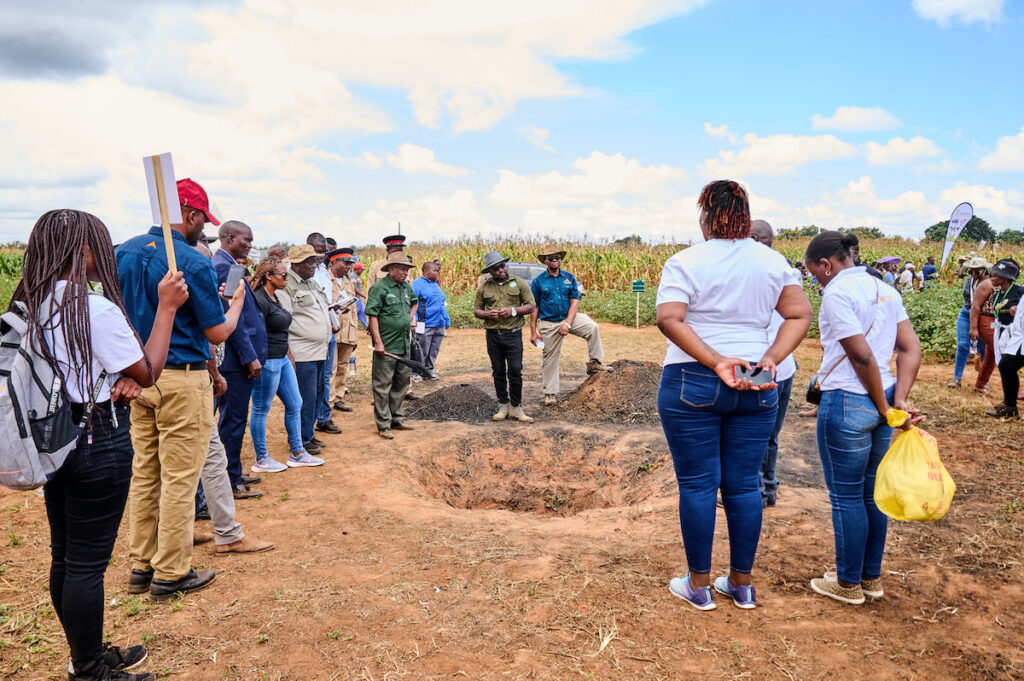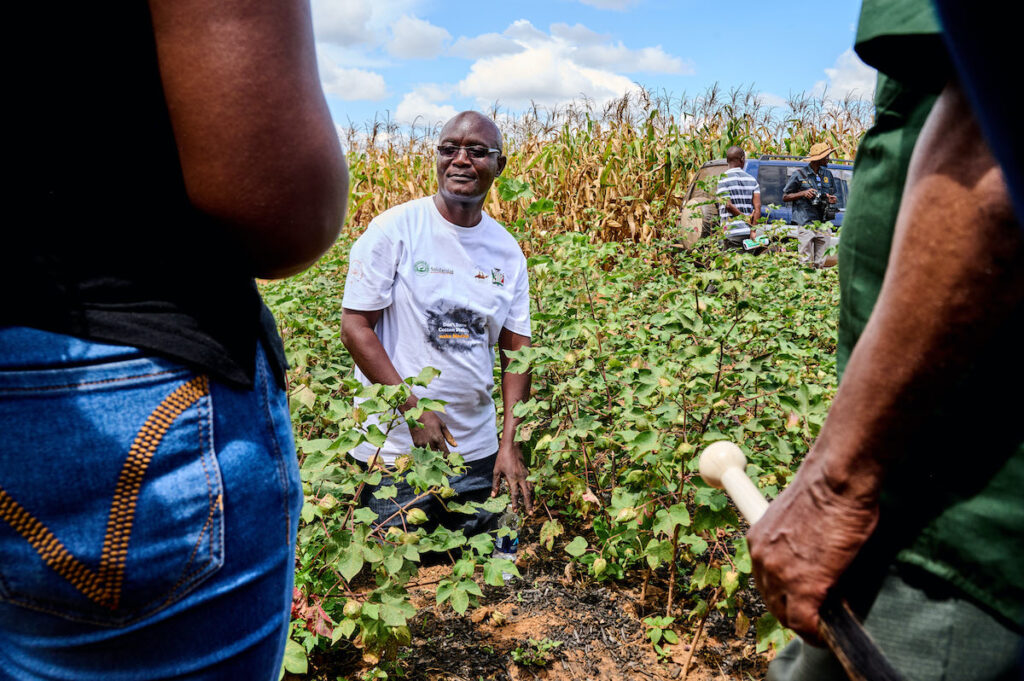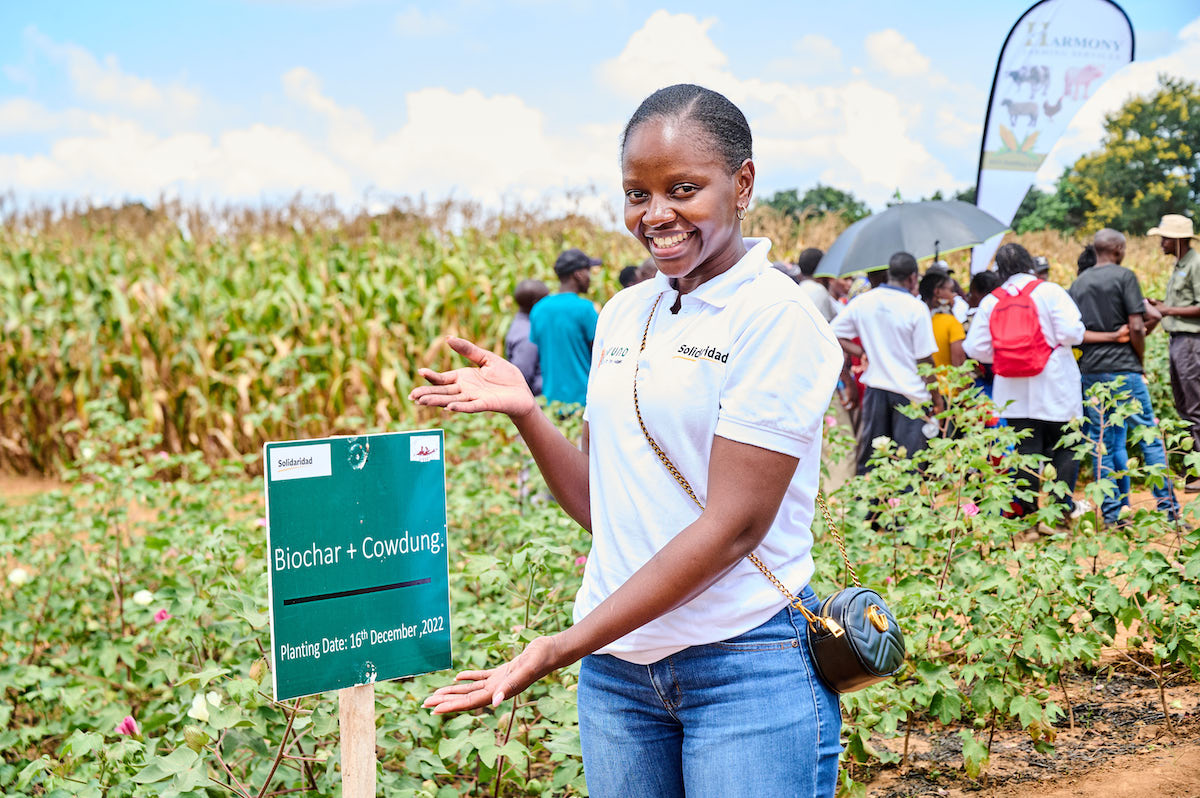Solidaridad’s RECLAIM Sustainability! Cotton programme continues its biochar project in Zambia.
In Zambia, Solidaridad’s RECLAIM Sustainability! Cotton programme employs a multi-stakeholder approach to enhance cotton production, foster a responsive policy and regulatory environment, and ensure fair value distribution within the country. An early objective of the programme was to introduce regenerative practices, like biochar, to Zambian farmers.
Biochar is the end product when waste plant material is heated to high temperatures without oxygen. Unable to catch fire, the material is ‘pyrolyzed’ — it turns into a solid that has captured its carbon in a lightweight and porous material that resembles charcoal, and that has been used by farmers for thousands of years to improve their crop yields.
Biochar possesses unique qualities as a soil amendment. It supports soil health through increased nutrient availability and water retention, improves climate resilience through carbon removal, and enhances cotton yields. By providing training on biochar production and adoption, the project aimed to support farmers with a sustainable solution to improve agricultural productivity and improve farmers livelihoods.
Three strategic locations were chosen in Southern Province for the biochar project. Munyumbwe, Sinazongwe and Magoye are renowned for their conducive environment for cotton production and proximity to cotton ginneries. Historically, these areas have seen significant cotton cultivation, making them ideal for implementing the biochar technology to benefit a large number of cotton farmers.
Materials, methods and results
A total of 120 farmers were recruited across three selected sites using an electronic registration tool, ensuring representation from each area: 30 from Magoye, 40 from Munyumbwe, and 50 from Sinazongwe. Baseline surveys revealed a lack of awareness among farmers about biochar technology, highlighting the need for education and training. Training sessions were conducted for technical staff from the Cotton Development Trust (CDT), equipping them with skills for efficient biochar production while minimizing environmental impact.

Farmers were trained in the con-pit method of biochar production, emphasizing its benefits such as high-water retention and soil improvement. Demonstration plots were established with ten treatments, incorporating biochar with various inputs to optimize nutrient replenishment and ensure sustainability. Planting events, with community participation, showcased farmers’ enthusiasm for adopting innovative agricultural practices. Ongoing monitoring will evaluate the performance of biochar plots compared to traditional methods.
Early indications suggest promising outcomes from the adoption of biochar technology, with improved soil fertility and crop yields observed in demonstration plots. The integration of biochar with existing farming practices holds the potential to revolutionize cotton farming in Zambia, and it offers a sustainable solution to enhance agricultural productivity and uplift rural livelihoods.
Key benefits of biochar on cotton farming in Zambia
There are a number of ways that the implementation of biochar technology in cotton farming in Zambia has the potential to provide significant benefits for farmers.
Increased Crop Yields – By improving soil fertility and nutrient availability, biochar technology can lead to higher crop yields. Increased yields mean farmers can harvest more cotton, resulting in higher revenues and improved income levels. Data collected from the demonstration plots revealed promising outcomes, particularly in terms of average number of green bolls – a key indicator of cotton yield.
In Magoye, plots treated with synthetic fertilizer and biochar combined with cow dung demonstrated the highest green boll counts, showcasing the effectiveness of biochar-based treatments. Similarly, in Sinazongwe, biochar combined with cow dung exhibited excellent performance, highlighting its potential in enhancing crop productivity. Cotton plants treated with biochar exhibited a significant increase in yield, ranging from 15 to 35 cotton balls, surpassing the 5 to 10 cotton balls produced by plants treated solely with synthetic fertilizer.
Cost Savings on Fertilizers – Traditional chemical fertilizers can be expensive for smallholder farmers. By using biochar, which acts as a soil amendment and reduces the need for chemical fertilizers, farmers can save on input costs. This reduction in expenditure contributes directly to increased profits for farmers.
Improved Soil Health and Long-Term Productivity – Biochar helps to enhance soil structure, water retention, and microbial activity. Healthy soils not only support better crop growth but also contribute to long-term agricultural productivity. Farmers can continue to reap the benefits of improved soil health over multiple planting seasons, leading to sustained income generation.

Diversification of Income Streams – With increased crop yields and cost savings on fertilizers, farmers may have the opportunity to diversify their income streams. They could invest in other agricultural activities or non-farming ventures, thereby spreading risk and potentially increasing overall household income.
Access to Markets and Premium Prices – Improved crop quality resulting from biochar technology may enhance farmers’ access to markets and enable them to command premium prices for their produce. Buyers, including cotton ginneries and textile companies, may value the improved quality and consistency of cotton produced with biochar, leading to better returns for farmers.
Sustainable Farming Practices and Environmental Benefits – Biochar technology promotes sustainable farming practices by reducing reliance on chemical inputs and enhancing soil health. Sustainable farming practices not only benefit the environment by reducing chemical runoff and soil erosion but also position farmers as stewards of their land, potentially attracting support and funding from conservation organizations or government initiatives.
Capacity Building and Knowledge Transfer – Through training and capacity-building activities associated with biochar adoption, farmers gain valuable knowledge and skills that can empower them to make informed decisions about their farming practices. This knowledge transfer can lead to increased efficiency, productivity, and resilience in the face of environmental and economic challenges.
RECLAIM Sustainability! and biochar
RECLAIM Sustainability! is a five-year programme (2021-2025) that is being implemented in strategic partnership with the Dutch Ministry of Foreign Affairs. With this programme, Solidaridad strives to foster genuine and inclusive sustainability in global value chains, where the voices of farmers, miners, workers and citizens are well represented in decision making, while civil society is also strengthened.
Within the REClAIM Sustainability! Cotton project, the successful implementation of biochar technology represents a significant step forward in sustainable agriculture and rural development in Zambia. Continued support and investment in biochar initiatives are essential to realize the full potential of this innovative technology in transforming agricultural landscapes and supporting farming communities. By harnessing the power of biochar to improve soil health and crop productivity, smallholder cotton farmers are poised to achieve economic prosperity while safeguarding the environment for future generations.

